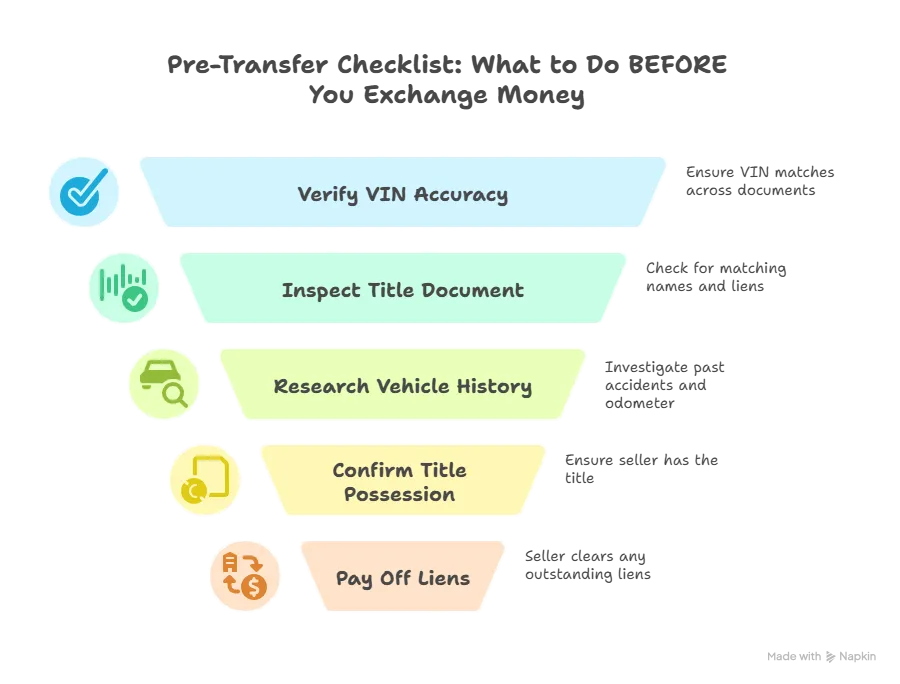Get your vehicle registered, fast.
U.S. Vehicle Title Transfer 2025: Step-by-Step Guide + Fees

A vehicle title serves as the official deed to your car, truck, motorcycle, or any motor vehicle. This legal document proves ownership and establishes your right to sell, transfer, or modify the vehicle as you see fit. Unlike a registration card that simply allows you to drive legally, the title represents actual ownership rights that courts recognize in disputes.
Proper title transfer protects both buyers and sellers from serious legal and financial consequences. When sellers fail to complete the transfer correctly, they remain legally responsible for parking tickets, moving violations, and even accident liability involving the vehicle. Buyers who skip proper procedures may find themselves unable to register the vehicle, obtain insurance coverage, or prove legal ownership when stopped by law enforcement.
This guide provides state-specific requirements, mandatory forms, accurate fee schedules, and detailed procedures that eliminate confusion and prevent costly mistakes. Every state maintains different rules for documentation, timing, and processing, making navigation challenging without proper guidance.
Key Takeaways
Required documentation and forms for seamless transfers across all 50 states.
Step-by-step procedures for both buyers and sellers to avoid legal complications.
Fee structures and deadlines that prevent penalties and processing delays are crucial for the transfer of title.
Special scenarios including inheritance, gifts, and out-of-state transfers.
Common mistakes that void titles and how to prevent them.
Pre-Transfer Checklist: What to Do BEFORE You Exchange Money
The successful vehicle title transfer process begins before any money changes hands, ensuring a smooth transaction when you buy a car. Most title transfer problems stem from inadequate preparation, making this preliminary verification phase critical for protecting all parties involved.
For Both Buyer and Seller
Verify the VIN Accuracy
Vehicle Identification Numbers must match perfectly across all documents, as the title is a legal document that proves ownership. Locate the VIN on the vehicle's dashboard (visible through the windshield on the driver's side) and compare it against the title document. Check secondary VIN locations including the driver's side door jamb and engine bay for consistency.
Any discrepancy between the physical VIN and title documentation indicates potential fraud, clerical errors, or stolen vehicle concerns. Never proceed with transactions involving mismatched VINs, as this creates insurmountable legal problems for both parties.
For the Buyer
Inspect the Title Document Thoroughly
Examine the seller's name on the title certificate and verify it matches their government-issued identification exactly; they must sign the title for the transfer to be valid. Look for any listed lienholders such as banks, credit unions, or finance companies. If liens appear on the title, the seller must provide official lien release documentation before completing the sale, ensuring the title is a legal document free of encumbrances.
Check for alterations, white-out corrections, or suspicious modifications to the vehicle's title. Any changes to original information typically void the document, requiring duplicate title applications before proceeding with the transfer.
Research Vehicle History
Most states provide online title verification systems allowing buyers to check ownership history, lien status, and title problems before buying a used car. The National Motor Vehicle Title Information System (NMVTIS) offers federal-level verification for vehicles with interstate history.
Commercial vehicle history reports reveal accident damage, flood history, odometer rollbacks, and previous title issues that affect value and safety. These reports cost significantly less than potential repair bills or legal problems from undisclosed vehicle problems when buying or selling a car.
For the Seller
Confirm Title Possession
Locate your original title certificate before transferring ownership of the vehicle for sale. If the title is lost, damaged, or stolen, apply for a duplicate title immediately through your state's motor vehicle agency. This process typically requires 10-15 business days, so plan accordingly to avoid delaying the sale.
Most states charge $15-50 for duplicate titles and require proof of identity, vehicle information, and current registration. Some states offer expedited processing for additional fees when time constraints exist for the transfer of title.
Pay Off Outstanding Liens
Any remaining auto loan balance must be cleared before transferring ownership. Contact your lender to obtain payoff amounts and arrange final payment. The lender will then provide lien release documentation or sign the title directly, depending on state requirements.
Electronic lien systems in many states require lenders to release liens digitally, after which the state issues a clear title to the owner. This process can take 7-10 business days, so coordinate payoff timing with sale schedules.

The Seller's Guide: How to Legally Release Your Vehicle
Proper title completion protects sellers from future liability while ensuring buyers receive clear ownership rights. Each state requires specific information and signatures, making attention to detail essential for valid transfers.
Step 1: Complete the Title Certificate Correctly
Odometer Reading Documentation
Record the exact mileage showing on the odometer at the time of sale to maintain accurate information on the title. Round to the nearest whole mile without including decimal points or tenths. Federal law requires odometer disclosure for vehicles under 10 years old, with specific penalties for false statements.
Mark the appropriate box indicating odometer accuracy: "Actual Mileage," "Not Actual Mileage," or "Mileage Exceeds Mechanical Limits." Choose "Not Actual Mileage" if the odometer has been replaced, repaired, or you suspect tampering when selling a vehicle.
Seller Information Requirements
All registered owners listed on the title must print their full legal names and sign in designated areas. When multiple owners exist, pay attention to "AND" versus "OR" designations. "AND" requires all owners to sign, while "OR" allows any single owner to complete the transfer.
Enter the buyer's complete legal name and current address in the designated purchaser section. Avoid nicknames, abbreviations, or incomplete addresses that could complicate the buyer's registration process.
Sale Details Documentation
Record the final negotiated purchase price in the sales price field on the title to the buyer. Some states use this amount for sales tax calculations, while others accept fair market value determinations. Never enter false sale prices, as this constitutes fraud and may trigger audits.
Date the transfer on the actual day of sale and vehicle delivery. This date establishes the beginning of the buyer's ownership period and affects registration deadlines, liability transfer, and title transfer deadline calculations.
Critical Warning About Alterations
Never use correction fluid, erasers, or cross-outs on title documents. Any alteration automatically voids the title, forcing you to apply for a duplicate and restart the entire process. If mistakes occur, obtain a new title before proceeding with the sale.
Step 2: Create a Bill of Sale Document
The bill of sale vehicle provides additional legal protection and documentation for both parties involved in transferring a vehicle. While not all states mandate bills of sale, creating one protects against disputes and provides backup documentation for registration purposes.
Include essential information: buyer and seller names and addresses, vehicle details (VIN, make, model, year, color), final sale price, sale date, and both parties' signatures. Many states provide official bill of sale forms through their motor vehicle agencies, or you can create a simple document containing required information.
Step 3: Remove License Plates Properly
License plates remain with the seller in most states, not with the vehicle, which is important when selling a vehicle. Remove plates immediately after completing the sale to prevent the new owner from driving with your registration. Check your state's specific requirements, as some allow temporary plate transfers.
Store removed plates safely or return them to your motor vehicle agency if required. Some states mandate plate surrender, while others allow retention for transfer to replacement vehicles purchased within specific timeframes when selling a car.
Step 4: Report the Sale to Motor Vehicle Authorities
Filing a Notice of Transfer and Release of Liability protects sellers from future tickets, accidents, and legal problems involving the vehicle. Most states offer online reporting systems for immediate processing, while others require mail or in-person submissions.
Submit this notification within your state's deadline (typically 5-30 days) to ensure liability protection. Include the buyer's information, vehicle details, sale date, and sale price as recorded on the title and bill of sale.
The Buyer's Guide: How to Legally Claim Your New Vehicle
Taking legal possession requires specific documentation, proper timing, and compliance with your state's registration requirements. Understanding these steps prevents delays, penalties, and legal complications that could affect your ability to drive legally after transferring a vehicle.
Step 1: Gather Required Documentation
Create a comprehensive document checklist before visiting motor vehicle offices:
Essential Documents:
Properly signed title from the seller
Completed bill of sale with accurate information
Official lien release documents (if applicable)
Proof of current auto insurance coverage
Valid driver's license or state identification
Completed application for title and registration
Additional Requirements by State: Some states require safety inspections, emissions testing, or VIN verification before registration. Research your specific state requirements through official motor vehicle agency websites to avoid multiple trips.
Step 2: Complete Official Applications
The car title transfer requirements vary significantly between states, but most require standardized application forms for title and registration processing. Common forms include "Application for Certificate of Title" or "Title and Registration Application."
Download current forms from your state's official motor vehicle website rather than using outdated versions that may cause processing delays. Complete all sections accurately using the same information recorded on the title and bill of sale documents.
Some states offer combined title and registration applications, while others require separate forms for each process. Verify requirements with your local motor vehicle office to ensure proper documentation.
Step 3: Obtain Auto Insurance Coverage
Proof of insurance remains mandatory before titling and registering vehicles in all states. Contact insurance companies to establish coverage before visiting motor vehicle offices, as you cannot complete registration without valid proof of coverage.
Provide your insurance company with vehicle information including VIN, make, model, year, and intended use to ensure proper coverage during the transfer of ownership. Some insurers offer temporary coverage pending final registration, while others require full policy activation before issuing proof documents for the ownership of a vehicle.
If you encounter complex registration situations like off-road vehicles or specialty vehicles, Street Legal Hookup provides experienced guidance for navigating challenging titling scenarios across all 50 states. Their expertise with unusual registration requirements can save time and prevent costly mistakes in complicated transfers, especially when you need to register your vehicle.
Step 4: Visit Motor Vehicle Offices and Pay Required Fees
Locate your appropriate local office through your state's motor vehicle agency website. Some states process titles through local DMV offices, while others use county clerks, tax assessors, or specialized agencies for the transfer of ownership.
Typical Fee Structure:
Title fees: $15-100 depending on state
Registration fees: Varies by vehicle type and weight
Sales tax: 0-10% of purchase price or fair market value
Late penalties: $25-100 for missed deadlines
Processing fees: $5-25 for administrative costs
The title transfer fees calculation depends on your state's specific fee schedule and vehicle characteristics as outlined on the DMV website. Bring multiple payment methods, as some offices accept only cash or checks while others allow credit cards.
Processing Timeline Expectations
Most states issue temporary registration immediately, allowing legal driving while permanent documents are processed. Permanent titles typically arrive by mail within 15-30 business days, though delays can occur during peak periods.
Some states offer expedited processing for additional fees when time constraints exist. Electronic title systems in progressive states may provide faster processing than traditional paper-based systems.
How to Handle Special Title Transfer Scenarios
Complex ownership situations require specialized procedures and additional documentation beyond standard buyer-seller transfers. Understanding these scenarios prevents delays and ensures compliance with legal requirements.
Inheriting a Vehicle
The vehicle ownership transfer through inheritance follows probate law requirements rather than standard sale procedures, which may also involve registering the car in the heir's name. Required documentation depends on estate planning methods and state probate requirements.
Required Documentation: Ensure you have all necessary information on the title.
Certified death certificate
Letters Testamentary or Letters of Administration from probate court
Affidavit of Heirship (for smaller estates avoiding probate)
Proof of heir relationship to deceased owner is necessary for the transfer of ownership form.
Completed inheritance title application for transferring ownership of the vehicle.
Joint Tenancy with Rights of Survivorship simplifies inheritance transfers when multiple owners exist on the original title. The surviving owner can typically transfer the title independently after providing death certificate documentation to the department of motor vehicles.
Probate Requirements vary significantly between states, with some requiring court approval for vehicle transfers while others allow simplified affidavit procedures for vehicles below certain values. Consult probate attorneys for complex estate situations involving multiple heirs or contested ownership.
Gifting Vehicles to Family Members
Gift transfers allow ownership changes without monetary exchange, often reducing or eliminating sales tax obligations. Most states provide specific gift transfer procedures for qualifying family relationships.
Eligible Recipients typically include spouses, children, grandchildren, parents, siblings, and sometimes additional family members as defined by state law. Some states require minimum relationship duration or shared residency requirements.
Gift Transfer Documentation:
Completed gift affidavit or gift transfer form
Proof of family relationship (birth certificates, marriage licenses)
Standard title transfer documentation
Recipient's insurance and identification
The vehicle registration transfer for gifts follows similar procedures to sales but may offer reduced fees or tax exemptions. Verify your state's specific gift transfer benefits and requirements before completing the transfer.
Transferring Out-of-State Titles
New residents must transfer out-of-state titles within specific timeframes, typically 30-90 days after establishing residency. This process often requires additional verification steps beyond standard in-state transfers.
Additional Requirements: Verify that all necessary documents, including the back of the title, are completed correctly.
VIN verification by authorized inspector
Proof of new state residency
Out-of-state title surrender
Emissions testing (where required)
Safety inspection (where required)
The out-of-state title transfer process varies significantly between states, with some requiring extensive documentation while others accept straightforward title submissions. Research destination state requirements before relocating to ensure smooth transitions.
VIN Verification typically requires inspection by law enforcement, motor vehicle agency staff, or authorized private inspectors. This process confirms the vehicle's physical VIN matches title documentation and checks for theft indicators.
Removing Liens After Loan Payoff
The lien release document procedures depend on your state's lien recording system and lender cooperation, which are essential for a smooth transfer of the title to the buyer. Traditional paper-based systems require physical document handling, while electronic systems enable faster digital processing.
Electronic Lien Systems automatically update title records when lenders submit electronic releases. These states typically mail clear titles within 10-15 business days after lien release processing.
Paper-Based Systems require lenders to sign title documents or provide separate lien release letters. Owners must then submit this documentation to obtain clear titles through their motor vehicle agencies.
Contact your lender immediately after final payment to initiate lien release procedures. Some lenders process releases automatically, while others require specific requests and processing time.
Your Vehicle Title Transfer Challenges, Solved by Experts
Street Legal Hookup has successfully helped thousands of vehicle owners navigate complex registration requirements while saving substantial money through legal Montana LLC registration.
Our team specializes in the unique challenges facing motorcycle, RV, and specialty vehicle owners. We understand the specific requirements for California motorcycle compliance, the complexities of custom vehicle registration, and the legal frameworks supporting Montana LLC registration.
Proven Track Record
Our experience includes successful registration of military vehicles, imported motorcycles, custom RVs, and street legal motorcycle modifications. We've handled cases involving complex compliance requirements and unique vehicle types.
Legal Expertise
Montana LLC registration requires proper legal structure and ongoing compliance. Our team ensures your LLC meets all Montana requirements while providing the business documentation necessary to support legal vehicle ownership.
Money-Back Guarantee
We stand behind our work with a complete satisfaction guarantee. If we cannot successfully complete your vehicle registration, you receive a full refund.
Frequently Asked Questions
Can I transfer a title online in most states?
Online title transfers remain limited to specific scenarios in most states. While many states offer online services for duplicate titles, renewals, and lien releases, complete ownership transfers typically require in-person visits or mail submissions with original documents and signatures.
What happens if the seller made mistakes on the title?
Title mistakes typically void the document, requiring the seller to get a replacement title before proceeding. Never attempt to correct errors with white-out or cross-outs, as this automatically invalidates the title and creates legal problems for both parties.
How long does it take to receive a new title after transfer?
Most states mail permanent titles within 15-30 business days after processing completed applications. Some states offer expedited processing for additional fees, while electronic title systems may provide faster service than traditional paper-based processing.
Does the bill of sale need notarization in all states?
Notarization requirements vary by state, with some requiring notarized bills of sale while others accept simple signed documents. Check your specific state requirements through official motor vehicle agency websites to ensure compliance with local laws when buying a new car.
What documents prove vehicle ownership besides the title?
The title certificate represents the primary ownership document recognized by all states and courts for the vehicle's title. While registration cards, insurance policies, and bills of sale provide supporting evidence, only the properly signed title transfers legal ownership rights between parties.
Can I drive immediately after buying a vehicle?
Most states allow temporary driving with proper documentation including signed title, insurance proof, and bill of sale. However, you must complete registration within state deadlines (typically 30 days) to maintain legal driving privileges and avoid penalties.
What if the previous owner cannot be located for title signing?
Missing owners create complex legal situations requiring specialized procedures through motor vehicle agencies or courts. Some states offer abandoned vehicle procedures, while others require legal action to establish ownership rights through adverse possession or court orders.
How do I handle vehicles with no title or lost titles?
The duplicate title application process allows owners to obtain replacement titles for lost, stolen, or destroyed documents. This requires proof of identity, vehicle information, and sworn statements about the original title's status.
What fees apply to vehicle title transfers?
Transfer fees vary significantly between states but typically include title fees ($15-100), registration fees (varies by vehicle), sales tax (0-10% of value), and processing fees ($5-25) when transferring a car title. Some states add late penalties for missed deadlines.
Can I transfer ownership without the physical title document?
Physical title possession remains mandatory for legal transfers in most states. Electronic title systems may allow digital transfers in some locations, but traditional paper titles require original document submission for ownership changes at the local DMV.
What happens if I miss the title transfer deadline?
Late transfers typically incur penalty fees ranging from $25-100, depending on state regulations and the local DMV's policies on transferring a vehicle. Extended delays may result in additional complications including difficulty obtaining insurance, registration problems, or legal liability issues for sellers.
How do gift transfers differ from regular sales?
Gift transfers often qualify for reduced or eliminated sales tax through family member exemptions when you sell your car. Required documentation typically includes gift affidavits, family relationship proof, and standard title transfer paperwork, but fees may be significantly lower than sale transfers when selling a car.
Conclusion
Successfully transferring vehicle titles requires understanding state-specific requirements, proper documentation, and careful attention to detail throughout the process. This guide provides the foundation for completing transfers safely and legally, whether buying, selling, inheriting, or gifting vehicles.
Remember that title transfers protect significant financial investments while ensuring legal compliance across state boundaries. Taking time to complete procedures correctly prevents costly mistakes, legal complications, and administrative delays that could affect your ability to drive legally.
The documentation requirements, fee structures, and processing timelines vary between states, making research and preparation essential for smooth transfers. Use official state resources, maintain complete records, and never attempt shortcuts that could void titles or create legal problems.
"Skip the roadblocks. Street Legal Hookup makes title transfers simple in all 50 states. Let us handle the paperwork so you can get back to enjoying your vehicle fast, easy, and stress-free."

Register or Title Your Vehicle From Any State, Stress-Free
Click below, answer a few quick questions, and start your registration in minutes.
Get Road-Ready EasilyREADY TO get street legal?
Register or Title Your Vehicle From Any State, Stress-Free.
Click below, answer a few quick questions, and start your registration in minutes.

Register or Title Your Vehicle From Any State, Stress-Free. Guaranteed
Street Legal Hookup
Register Your Vehicle
LEGAL
STREETLEGALHOOKUP.COM IS A MONTANA VEHICLE REGISTRATION COMPANY, UNAFFILIATED WITH ANY GOVERNMENT AGENCY © 2025 Street Legal Hookup Inc. All rights reserved. Privacy Policy | Terms Of Service
